
-
 Taliban govt clearing 'un-Islamic' books from Afghanistan shelves
Taliban govt clearing 'un-Islamic' books from Afghanistan shelves
-
Asian markets struggle as traders weigh geopolitical tensions

-
 Iraq holds its first census in nearly 40 years
Iraq holds its first census in nearly 40 years
-
SpaceX fails to repeat Starship booster catch, as Trump watches on
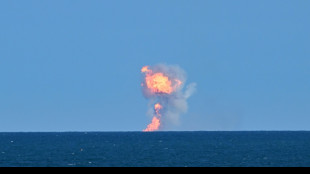
-
 European powers, US seek to censure Iran at UN nuclear watchdog board
European powers, US seek to censure Iran at UN nuclear watchdog board
-
SpaceX fails to repeat Starship booster catch, as Trump looks on

-
 European stocks fall on Ukraine-Russia fears, US focused on earnings
European stocks fall on Ukraine-Russia fears, US focused on earnings
-
Trump names China hawk Howard Lutnick commerce secretary

-
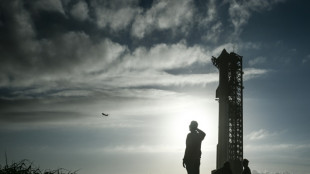 SpaceX set for Starship's next flight -- with Trump watching
SpaceX set for Starship's next flight -- with Trump watching
-
Top-selling daily French daily Ouest-France stops posting on X

-
 Russian invasion toll on environment $71 billion, Ukraine says
Russian invasion toll on environment $71 billion, Ukraine says
-
New Botswana leader eyes cannabis, sunshine to lift economy

-
 China's Xi urges 'strategic' ties in talks with Germany's Scholz
China's Xi urges 'strategic' ties in talks with Germany's Scholz
-
COP29 negotiators strive for deal after G20 'marching orders'

-
 Walmart lifts full-year forecast after strong Q3
Walmart lifts full-year forecast after strong Q3
-
Son of Norwegian princess arrested on suspicion of rape
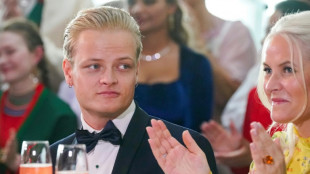
-
 US lawmaker accuses Azerbaijan in near 'assault' at COP29
US lawmaker accuses Azerbaijan in near 'assault' at COP29
-
Spain royals to visit flood epicentre after chaotic trip: media
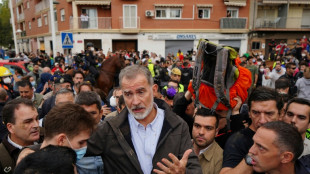
-
 French farmers step up protests against EU-Mercosur deal
French farmers step up protests against EU-Mercosur deal
-
Burst dike leaves Filipino farmers under water

-
 Markets rally after US bounce as Nvidia comes into focus
Markets rally after US bounce as Nvidia comes into focus
-
Crisis-hit Thyssenkrupp books another hefty annual loss

-
 Farmers descend on London to overturn inheritance tax change
Farmers descend on London to overturn inheritance tax change
-
Floods strike thousands of houses in northern Philippines

-
 SpaceX set for Starship's next flight, Trump expected to attend
SpaceX set for Starship's next flight, Trump expected to attend
-
Several children injured in car crash at central China school

-
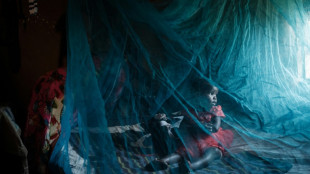 Urban mosquito sparks malaria surge in East Africa
Urban mosquito sparks malaria surge in East Africa
-
Many children injured after car crashes at central China school: state media

-
 Asian markets rally after US bounce as Nvidia comes into focus
Asian markets rally after US bounce as Nvidia comes into focus
-
Tens of thousands march in New Zealand Maori rights protest

-
 Five takeaways from the G20 summit in Rio
Five takeaways from the G20 summit in Rio
-
Parts of Great Barrier Reef suffer highest coral mortality on record

-
 Defiant Lebanese harvest olives in the shadow of war
Defiant Lebanese harvest olives in the shadow of war
-
Divided G20 fails to agree on climate, Ukraine

-
 Can the Trump-Musk 'bromance' last?
Can the Trump-Musk 'bromance' last?
-
US to call for Google to sell Chrome browser: report

-
 Trump expected to attend next Starship rocket launch: reports
Trump expected to attend next Starship rocket launch: reports
-
Stocks, dollar hesitant as traders brace for Nvidia earnings

-
 Biden in 'historic' pledge for poor nations ahead of Trump return
Biden in 'historic' pledge for poor nations ahead of Trump return
-
Tropical storm Sara kills four in Honduras and Nicaragua

-
 Spanish resort to ban new holiday flats in 43 neighbourhoods
Spanish resort to ban new holiday flats in 43 neighbourhoods
-
Phone documentary details Afghan women's struggle under Taliban govt

-
 G20 wrestles with wars, 'turbulence' in run-up to Trump
G20 wrestles with wars, 'turbulence' in run-up to Trump
-
Stocks, dollar hesitant as traders eye US rate outlook, Nvidia

-
 G20 wrestles with wars, climate in run-up to Trump
G20 wrestles with wars, climate in run-up to Trump
-
G20 host Brazil launches alliance to end 'scourge' of hunger

-
 Stocks, dollar hesitant as traders scale back US rate cut bets
Stocks, dollar hesitant as traders scale back US rate cut bets
-
Trump confirms plan to use military for mass deportation

-
 UN climate chief at deadlocked COP29: 'Cut the theatrics'
UN climate chief at deadlocked COP29: 'Cut the theatrics'
-
Tractor-driving French farmers protest EU-Mercosur deal


Five things to know about Venezuela
Venezuela, the once-prosperous South American country now scarred by years of economic ruin and political repression, holds elections on July 28, with authoritarian President Nicolas Maduro seeking a third term.
Here are five things to know about the country:
- From Bolivarismo to Chavismo -
The Bolivarian Republic of Venezuela is named after national icon Simon Bolivar, nicknamed "El Libertador" for his role in helping former Spanish colonies in South America achieve independence in the early 1900s.
Bolivar inspired the leftist firebrand Hugo Chavez, a close ally of late Cuban leader Fidel Castro, who led the country from 1999 until his death from cancer in 2013.
Hugely popular, the anti-American Chavez endeared himself to Venezuelans as a man of the people, using the country's oil wealth to lift millions out of poverty.
But his far less charismatic successor, Nicolas Maduro, has presided over an unprecedented economic collapse, sparked partly by a fall in oil prices and US sanctions imposed in response to his crackdown on the opposition.
Maduro's reelection in 2018 was rejected as illegitimate by most Western and Latin American countries.
Hopes of a return to democracy in this election fizzled after he barred his main opponent from running on charges of corruption that have been widely dismissed as spurious.
- Oil collapse -
Venezuela was once South America's biggest oil producer, pumping 3.5 million barrels of crude per day in 2008. But by 2020, mismanagement and the US sanctions had sent output plunging to under 400,000 barrels, before it recovered to around a million last month.
The sector's collapse caused a spectacular contraction of the country's finances, with GDP shrinking by 80 percent over 10 years and hyperinflation making the bolivar currency virtually worthless.
The United States suspended some sanctions on the oil industry after Maduro's government and the opposition agreed last year to hold a free and fair vote in 2024.
But the sanctions were restored after opposition leader Maria Corina Machado was barred from running.
- Battling crime -
Venezuela is consistently ranked as one of the world's most dangerous countries, though the nation of 30 million people is no longer seen as the cut-throat society it once was.
About four years ago, the government launched a crackdown on gangs operating in the slums and prisons, and the number of violent deaths fell last year by about a quarter, to 26.8 per 100,000 inhabitants, according to the independent Venezuelan Prison Observatory.
But experts say criminal gangs continue to carry out extortion, which is on the rise.
- The things they carried -
About one in four Venezuelans -- some seven million people -- have fled the country to escape the economic and political crisis.
Many have moved to other Caribbean and Latin American countries, but some have risked their lives on a long, dangerous trek through Central America and Mexico to reach the United States. Still others have moved to Europe or Asia.
With them they have taken their daily cornmeal flatbread, the arepa, which has gained popularity as a gluten-free treat. The arepa, which can be eaten with soup or filled with cheese, meat, beans, seafood or vegetables, have now shown up in bakeries and food trucks from New York to Tokyo.
- Angel Falls -
Untouched by politics or the economy, Venezuela boasts the highest waterfall in the world, Angel Falls, at 979 meters (3,212 feet), a top tourist attraction.
Spotted by US pilot Jimmy Angel in 1937 in remote Bolivar state, the falls are part of the vast Canaima National Park, a UNESCO World Heritage Site.
St.Ch.Baker--CPN
